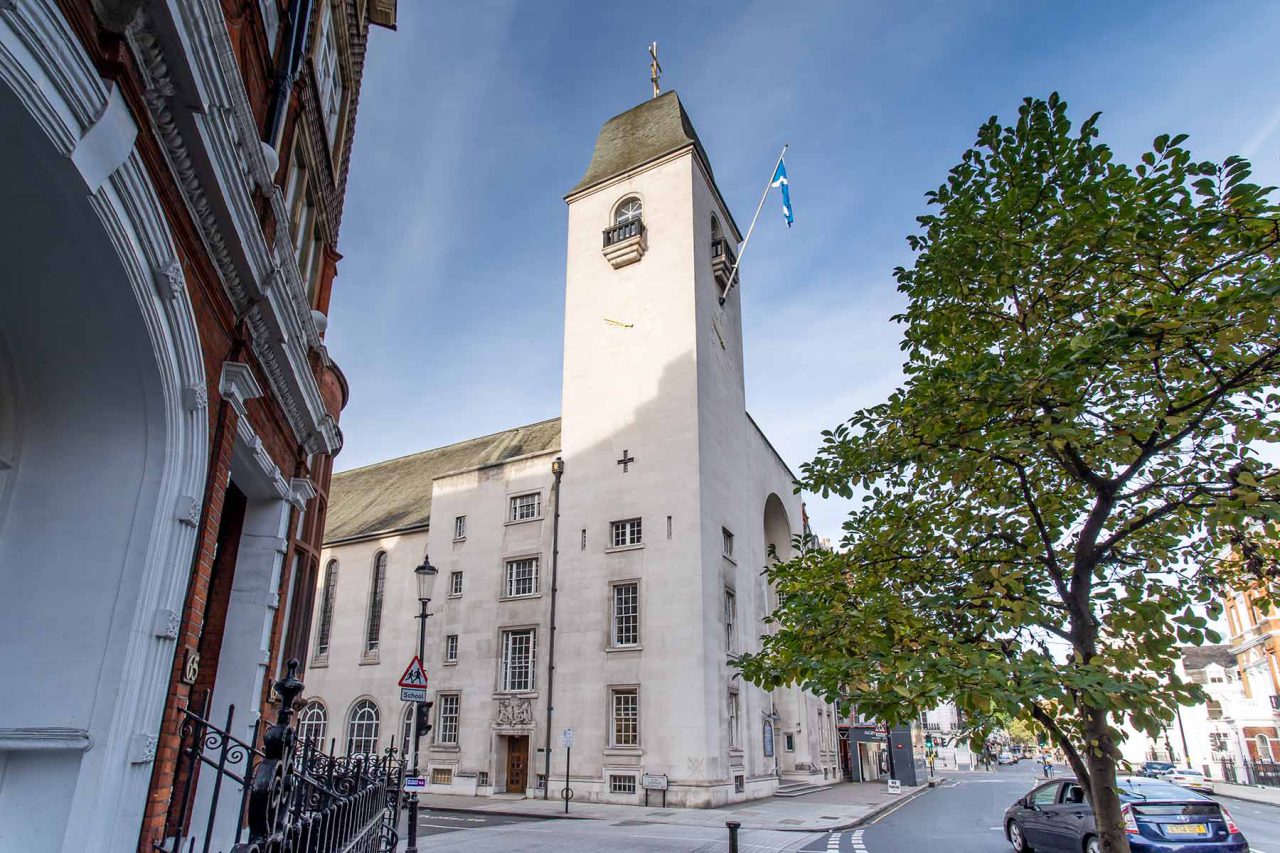Sermon 1st June 2025
Sermon 8th June 2025
ST COLUMBA’S, PONT STREET,
SUNDAY 8th JUNE 2025 11.00 A.M.,
NEW MEMBERS’ SERVICE & HOLY COMMUNION
FOR PENTECOST & ST COLUMBA’S DAY
“Come, let us build ourselves a city, and a tower with its top in the heavens,
and let us make a name for ourselves;
otherwise, we shall be scattered abroad upon the face of the whole earth.” Genesis 11
Wings composed of feathers and wax give lift off to a famous Greek myth.
Icarus – wings invented by his father, Daedalus,
parent and son make their escape from captivity on the island of Crete.
Dad warns junior not to fly too low,
which would cause the feathers to get wet with seawater
or too high, too close to the sun,
causing the wax to melt.
Unfortunately, the desire to rise higher, risk further,
the reluctance to heed wise advice – prove the young man’s destruction.
Higher and higher Icarus soars – till too close to the sun –
melted wax and freefall.
Former Poet Laureate, Carol Ann Duffy gave the tale a modern twist.
From her collection of poems envisioning the perspective of wives of famous men:
The World’s Wife – Mrs Icarus:
I’m not the first or the last to stand on a hillock
watching the man she married prove to the world
he’s a total, utter, absolute, Grade A pillock.
Vaulting ambition; pride before a fall; Vanitas, vanitas.
A more sombre take on hubris, from the pen of Percey Shelley: (Ozymandias)
Portrayal of a once mighty royal statue, now an abandoned wreck:
I met a traveller from an antique land,
Who said— “Two vast and trunkless legs of stone
Stand in the desert. . . . Near them, on the sand,
Half sunk a shattered visage lies,
(A sculptured face suggesting cruelty – wrinkled lip, and sneer of cold command.)
… …
And on the pedestal, these words appear:
My name is Ozymandias, King of Kings;
Look on my Works, ye Mighty, and despair!
Nothing beside remains. Round the decay
Of that colossal Wreck, boundless and bare
The lone and level sands stretch far away.”
“Come, let us build ourselves a city, and a tower with its top in the heavens,
and let us make a name for ourselves;
otherwise we shall be scattered abroad upon the face of the whole earth.”
Gathered round the campfire,
cloaks pulled close against the night air,
the Hebrews told their ancient tales.
Once upon a time, long, long ago,
the first families, descendants of Noah and his sons,
came from the east to the great plain of Shinar
and there they settled awhile.
There, with one language they spoke;
there too, they made a discovery – bricks and mortar.
And soon they urged each other:
“Let us build ourselves a city with a tower that touches heaven.
Let us make a name for ourselves.”
Why? “So, we will not be scattered across the face of the earth.
Here, fortified and strong, we will not be vulnerable or dependent.”
Another elder stirred the fire’s embers, took up the tale:
“But God was little pleased.”
“Why?” asked a child? “Wouldn’t a stairway to heaven be good?
Was God frightened – the people more powerful than God?”
The elder considered a moment: “No, I don’t think the Holy One feared that.
I think He feared/foresaw for the arrogance of that place –
the city, the tower, the name they craved –
the fame they wished to forge for themselves.
God knew it would end badly – to over-reach like that.
They thought that tower was their route to security and control;
vantage point, from which life’s ambiguities and vicissitudes would be removed.
Yet, from where God viewed it, even for the mighty tower
God required to come down.
God’s scale, God’s view, vaster than the tower builders could imagine.
So, the Lord said: “Come let us go down, let us confuse their language there,
so that they will not understand one another’s speech.”
Soon it was bickering and incomprehension:
“Hand me a hammer – he was given a sandwich.”
Soon, the city abandoned, the tower a half-finished folly,
the peoples, wandering across the face of the earth.
They planned to make a name for themselves – ambition, to ascend like gods.
They did secure a name – Babel – babble – place of confusion.
Following on the story of Noah and the Flood,
biblically, Babel represents another wrong turn,
because God scatters all the builders,
then moves swiftly to summon Abraham,
thus beginning an entirely new chapter in the religious story of humankind.
Language/languages, remain one of humanity’s great glories,
gifting variety, musicality and deftness of expression.
But language also divides, can be weaponised, a dog whistle,
us and them, prejudiced, violent.
The Babel tale begins: “The entire land had one language and a common speech.”
Though that sounds like a kind of nirvana,
it may not refer to a primal, pristine state of humanity, before a division of languages.
Scholars point out that Genesis Chapter 10,
with its exhaustive list of Noah’s descendants,
describes the division of humanity into seventy nations and seventy languages.
In contrast, Genesis 11, read today,
records one “power”, established over smaller nations;
With it has come the imposition of a single language and culture.
When at the end of the Babel story God “confuses the language” of the builders,
God not creating a new state of affairs but restoring an older diversity.
Babel as cautionary tale, against every form of totalitarianism or imperialism
that seeks domination through elimination of difference.
The late Chief Rabbi, Jonathan Sacks concluded on the Babel story:
“The miracle of monotheism
is that unity in Heaven creates diversity on earth,
and God asks us (with obvious conditions) to respect that diversity.”
Confused language, incomprehension, Babel – may be warning,
but is not final word; particularly, as we celebrate Pentecost.
Rushing winds. Tongues, as of fire. A cacophony of languages.
Accusations of drunkenness. Mass baptism.
The birthday/birth-story, the Church’s “big-bang.”
Pentecost ignites the dream to heal confusion.
Not by uniformity imposed, but by diversity recognised and valued.
The Spirt at Pentecost doesn’t restore a single language;
it declares all languages holy; all languages worthy of God’s stories.
No single language, no single people, no single group within a people,
can muster, or monopolise, the words sufficient to describe or praise God.
From the outset, the fledging church of Pentecost, is designed to be humble in its hierarchies,
and invitational to all, irrespective of geography or gender.
“Sons and daughters shall prophesy, young men see visions, old men dream dreams.
Even upon my slaves, both men and women,
in those days I will pour out my Spirit; and they shall prophesy.”
A good message for the day we welcome New Members –
Peter, Vivien, Lena, Margaret, Sarah and Lorrayne.
A good reminder to us all – “who know the Lord a little and seek to know Him more.”
Some decades ago, an anonymous couple came to a small garrison church in Edinburgh.
At the door after service, they explained they had come that day,
following a recent difficult circumstance.
They explained: “We came to see what the church had for us,
and maybe what we had for the church.”
May that source and motivation,
for our seeking and finding;
our offering and receiving –
inspire us this Pentecost day and beyond.
Sermon 15th June 2025
Sermon 22nd June 2025
ST COLUMBA’S, PONT STREET,
MORNING WORSHIP
SUNDAY 22nd JUNE 2025 11.00 A.M.,
SECOND SUNDAY AFTER PENTECOST
Jesus said to the Gerasene who he had healed:
“Return to your home and declare how much God has done for you.” Luke 8
“No farmer leaves his/her land through choice.
No mother wants to pack a bag and pick up her children
to leave all she knows.
No father wants to risk the lives of his family.
No grandmother wants to walk hundreds of miles
to spend the remains of her life in a camp or a country
where she understands nothing and is made to feel worthless.”
Today is Sanctuary Sunday (also referred to as Refugee Sunday),
The words quoted, are from prayers prepared by
Scottish Faiths Action for Refugees (‘SFAR’).
Sanctuary/Refugee Sunday asks churches around the world
to remember and pray for refugees, for those displaced from their homes.
Eritrea, Afghanistan, Ukraine, Syria, Sudan –
you could add to the list.
Scripture is full of stories of people on the move.
Joseph offered his father and brothers sanctuary in Egypt,
when their homeland was ravaged by famine.
Four hundred years later, Moses led that same people
out of Egypt to freedom and a new land.
Ruth left her home as a penniless widow
and worked as a migrant labourer in Bethlehem.
Mary and Joseph fled the violent persecution of Herod,
seeking asylum once more in Egypt.
(Throughout such tales, God exhibits loving concern
for the exiled and the stranger.)
This morning’s scriptures give a story of flight –
Elijah escaping the vengeance of Jezebel,
frightened to the point of wishing to end his own life.
Jesus’ journey on the other hand, is one of choice; the geography is significant.
“They sailed to the region of the Gerasenes, which is across the lake from Galilee.”
Opposite on the map – opposite, culturally and spiritually?
For reasons unspecified, Jesus chooses to cross a border,
with all the attendant dangers and potential misunderstandings.
The voyage itself is no pleasure cruise,
becoming occasion for the dramatic stilling of the storm (Luke 8:22-25.)
Jesus asleep, the boat being swamped, disciples despairing,
Jesus awaking, rebuking the raging waters – calm.
“Who is this, that even the winds and the waves obey him?”
Upon arrival on the foreign shore, another tempest.
Jesus encountering – or rather, encountered by –
the fiercely, feral, possessed man from the town –
shunned by the people’s fear and isolated by the internal furies
that lead to violent outbreak and self-harm –
confined to the shadow-world of tombs,
shackled by a society that cannot handle his demons.
In anger the figure approaches Jesus,
not to ask for help, but to demand that he go away.
‘What have you to do with me, Jesus, Son of the Most High God?
I beg you, do not torment, do not torture me.”
Confronted, Jesus does not dismiss or turn away;
does not assess the strange stranger as too different,
too broken or too dangerous.
Instead, engaging, he asks:
Not, What do you want? Or, What is wrong with you?
But, “What is your name?”
A reminder of first things – the name his parents gave/called.
A family name. A recognition/recall of original humanity.
The question of course identifies something of the man’s circumstances.
“My name is Legion.”
In the parlance of the story – legion, meaning many –
a reference perhaps to the hated imperial occupiers of distant Rome?
Legion – multiple malevolent spirits that disturb, confuse, torment,
robbing him of agency and freedom.
My name is “mob”.
The tale now takes a wild turn; echo of the recent storm?
“Now there on the hillside a large herd of swine was feeding;
and the demons begged Jesus to let them enter these.
So he gave them permission.
Then the demons came out of the man and entered the swine,
and the herd rushed down the steep bank into the lake and was drowned.
When the swineherds saw what had happened,
they ran off and told it in the city and in the country.
Then people came out to see what had happened,
and when they came to Jesus,
they found the man from whom the demons had gone
sitting at the feet of Jesus, clothed and in his right mind.”
“Clothed and in his right mind.”
Echo: “As many of you as were baptized into Christ have clothed yourselves with Christ. Galatians 3
If we fast forward from today’s reading, the very next encounter in Chapter 8,
is the healing of the woman with haemorrhages:
“If I touch only the hem of his garment,
one woman thought, I will be healed.” (Luke 8:43–48).
Healing and clothing – clothing and healing –
power of Christ and restoration of dignity –
restoration of dignity and power of Christ.
Cue celebrations?
When those in town and beyond learn about Jesus’s exorcism,
they flock to see. Of course they did.
But there is no warm return for the tomb dwelling, prodigal son;
nor is there welcome for Jesus the tomb raider.
No relief, no gratitude, no hospitality, no awe.
Instead, fear in the face of an inclusiveness
that transforms individuals and upends expectations and hierarchies.
They beg Jesus to leave them – go back to where you came from.
(a Galilee deportee.)
Recognising how unsettling the reality of Jesus’ ways and demands can be,
one commentator warns:
How do we move beyond the temptation to ask Jesus to leave?
“Return to your home and declare how much God has done for you.’
Mary Oliver, in her poem, “Sometimes” there is a stanza:
Instructions for living a life:
Pay attention.
Be astonished.
Tell about it.
Unsurprisingly, the restored Gerasene begs to stay close
to the one who called him by name,
even if it means leaving his homeland.
But Jesus directs him back to the very people who shunned him.
Jesus commissions him to be a storyteller,
With yarns that will help heal the world.
“So he went away, proclaiming throughout the city
how much Jesus had done for him.”
This morning began with Psalm 42
Referencing Jerusalem’s temple:
These things I remember, as I pour out my soul:
how I went with the throng and led them in procession to the house of God,
with glad shouts and songs of thanksgiving, a multitude keeping festival.
From that city which is currently home, reports in recent days from
Very Rev Canon Richard Sewell, Dean of St George’s College, Jerusalem
and from Stewart and Muriel, the ministers of the Church of Scotland congregations
in Jerusalem and Tiberias:
What follows is a little of their “telling about it.”
“In the College we have the benefit of the security of the Cathedral Close
and a very secure bomb shelter in the basement.
We have had to take shelter here intermittently through the past twenty months.
But we have been down there several times each day and night since last Friday.
Before we get to the bunker we can see missiles in the sky
being intercepted by the defence system
and we can feel/hear windows and sometimes the ground shake.
Most of the College staff live in parts of East Jerusalem and the West Bank
where there are no accessible bomb shelters.
They and their families can feel more vulnerable than we do in the College.
Iran is also part of our Anglican Province and Archbishop Hosam has jurisdiction,
So, we also feel great concern for civilians in Iran
and especially for the vulnerable Christians there.
While all of this understandably fills the news agenda everywhere,
for us a primary concern is still for the people of Gaza
who are being starved and bombed with no shelters or defence systems.
Attention must remain there too.
Also, on the West Bank which is being subjected to an almost total lockdown
and suffers painfully in many diverse ways.”
And from Tiberias, by the Lake of Galilee:
“The sirens that sounded Friday night,
as missiles launched in Iran began to arrive over Israel,
warned of more than the need to move to the nearest protected location.
The sirens warn of the long-term psychosocial and political consequences
of decades of Israeli military occupation of the Palestinian Territories,
and of the violence of resistance to it;
of the ongoing reverberations of the attack by Hamas on 7 October
and 20 months of IDF attacks by air and land in Gaza.
All parties have been dehumanised – Palestinian, Israeli, and International –
by the ongoing death, destruction and degradation of life.
War is not the answer and killing people is neither holy nor useful.”


